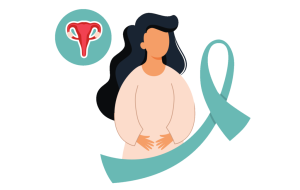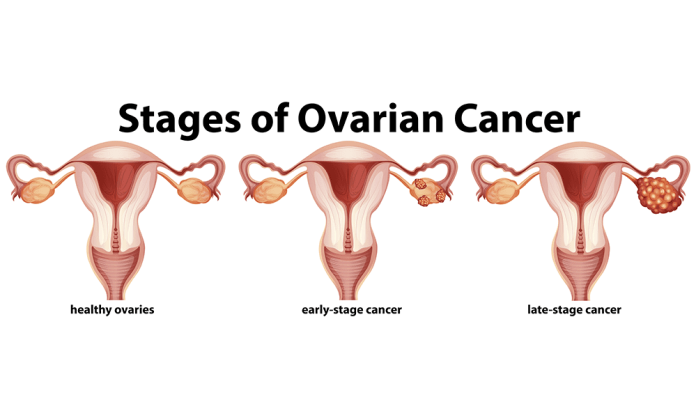Ovarian cancer is often diagnosed late, but early diagnosis can mean it is more treatable.
March is Ovarian Cancer Awareness Month, and we are on a mission to help improve knowledge of the disease and most importantly, the outcomes for those affected.
Experts say that getting potential signs checked promptly can help with being diagnosed early, at a stage when it’s more treatable.
At the moment, figures show only three in 10 diagnosed with the disease will live beyond 10 years, but it doesn’t need to be this way.
So, here’s what you need to know about the signs and symptoms to watch out for.
What is ovarian cancer?
Ovarian cancer affects the two ovaries which store the eggs needed to make babies, according to the NHS.
While anyone can get the disease, it mostly affects those over 50, and can sometimes run in families.
The trouble is that as symptoms are not always an obvious sign of cancer – like bloating – it is often diagnosed late. The health service points out, however, that early diagnosis can mean it is more treatable.
Ovarian cancer symptoms

Only one in 10 women know the main symptoms of ovarian cancer, according to Ovarian Cancer Action.
A key sign of the disease is that you may have certain symptoms frequently, for roughly 12 or more times a month. According to the NHS, these include:
- a swollen tummy or feeling bloated
- pain or tenderness in your tummy or the area between the hips (pelvis)
- no appetite or feeling full quickly after eating
- an urgent need to pee or needing to pee more often
Other symptoms of ovarian cancer can include:
- indigestion
- constipation or diarrhoea
- back pain
- feeling tired all the time
- losing weight without trying
- bleeding from the vagina after the menopause
While these symptoms are common and may be a sign of something harmless, or another condition, it’s important to get them checked by your doctor to increase your chances of successful treatment, should you need it.
Ovarian cancer causes

The risk of developing the disease increases with age – more than half of all UK cases are aged 65 and over.
Anyone with ovaries can get ovarian cancer, including women, trans men, non-binary people and intersex people with ovaries. If you’ve had surgery to remove your ovaries, then of course you can no longer get it.
There are a few factors that may mean you have a higher chance of getting ovarian cancer. These include if you:
- inherited a faulty gene, such as the BRCA genes (related to cancer) or those linked to Lynch syndrome (genetic predisposition to bowel cancer)
- had breast cancer or bowel cancer
- had radiotherapy treatment for a previous cancer
- have endometriosis or diabetes
- started your periods at a young age or went through the menopause late (over 55), or have not had a baby – may mean you’ve released more eggs (ovulated more)
- have never used any hormonal contraception, such as the pill or an implant
- are taking hormone replacement therapy (HRT)
- are overweight
- smoke
Lifestyle changes
There are certain lifestyle changes you can make to help lower your risk of ovarian cancer, including quitting smoking, being a healthy weight, and talking to your doctor about possible tests or treatments (like a hormonal contraception or removing your ovaries) if ovarian cancer runs in your family.
To help give yourself the best possible outcome, don’t delay in speaking to a doctor if you experience signs of ovarian cancer frequently.


